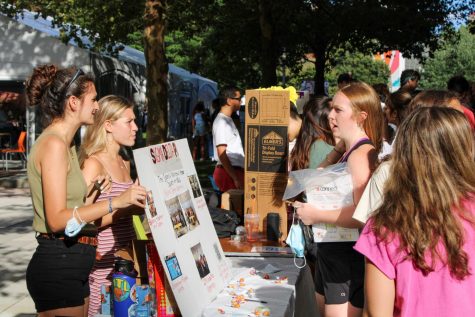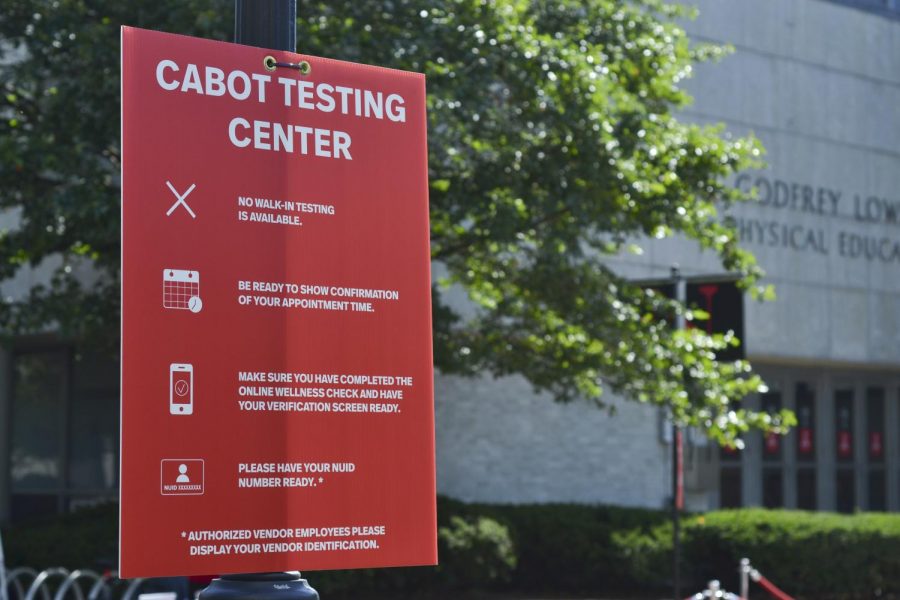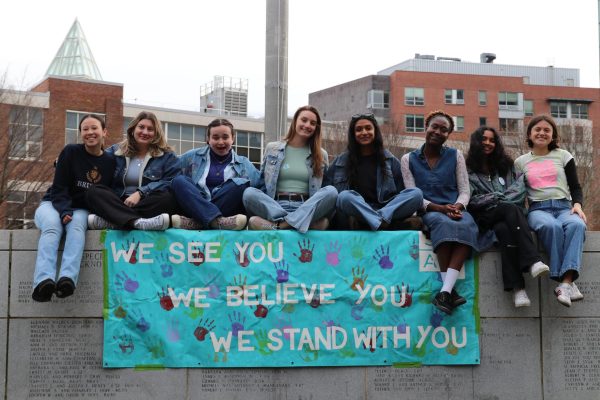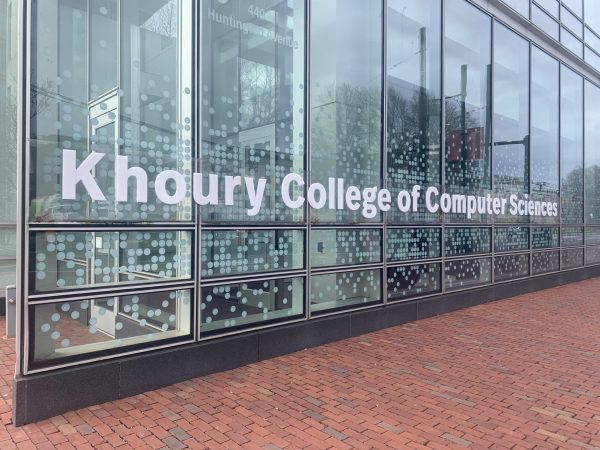Northeastern prepares for a more ‘normal’ fall semester
Students, faculty and staff were required to be vaccinated before the start of the fall semester, and will be tested once a week.
Entering another school year in the midst of the COVID-19 pandemic, second-year Cyrus Seyrafi said he is hopeful this semester will fill the gap in his college experience left by his abnormal first year. Last year didn’t feel like a true start to college, and Seyrafi said he is “panicked, but hesitantly optimistic” about the upcoming school year.
“Everyone’s coming back from what probably was pretty open summer, or pretty normal-esqe summer, so people are getting over the panic and whatnot and everyone’s vaccinated, so there’s a lot of potential for a really great time,” said Seyrafi, a math, philosophy and history triple major. “Hopefully, we’ll get that freshman year experience, and then we’ll be able to settle for three years of college instead of four.”
Sofia Van Lancker Brigulio, a second-year math and economics double major, echoed Seyrafi’s sentiment and said the restrictions imposed on activities, clubs and campus life last year by Northeastern made the year feel unreal.
“Last year, it didn’t really feel like college. It just felt like an online class,” Van Lancker Briguglio said. “There’s so many things that I feel like I missed out on in my first year, and I hope I get to experience them this year.”
Even though members of the Northeastern community will inevitably test positive for COVID-19 this year, Brandon Dionne, an associate clinical professor in the School of Pharmacy and Pharmaceutical Sciences, said the policies and practices Northeastern is implementing make him feel comfortable coming back for a more normal year.
“I think that they have a good plan in place to try to limit the risk of spread on campus,” Dionne said. “I also think that, just like last year, they’ll be very proactive, and if they start to see things moving in the wrong direction, then they’ll adjust their plan.”
Northeastern implements COVID-19 rules for fall semester
The pandemic has reached an entirely different point compared to when the fall 2020 semester started, a fact that is reflected in Northeastern’s COVID-19 policies regarding masking, vaccination and testing for the upcoming school year.
For masking, Northeastern has implemented an indoor mask mandate on campus effective Aug. 27., in accordance with the city of Boston’s mask mandate for all indoor public settings effective on the same day.
In preparation for the fall semester, Northeastern also announced a vaccination requirement in April for all students, staff, faculty and contract employees. Unless an individual has a religious or medical exemption, everyone must submit proof of vaccination online by the beginning of the semester. Students were required to submit proof by Aug. 15, and faculty and staff must submit by Sept. 8.
There’s some different risks because last year they still had the plans to maintain low density, which probably did help. This year since they’re planning to go back to full density, I think there are some potential higher risks of transmission, but I think that’s counteracted by the vaccinations and use of masks.
— Brandon Dionne
In contrast to last year’s three-day testing cadence, this year, regardless of vaccination status, members of the Northeastern community will be required to get tested once a week.
Dionne, who is practicing as a clinical pharmacist in infectious disease at Brigham and Women’s Hospital, said the vaccination requirement is a large part of what makes him comfortable returning to campus. He added that vaccinations are crucial to helping reduce the risk of transmission and the worst outcomes of COVID-19.
“There’s some different risks because last year they still had the plans to maintain low density, which probably did help. This year since they’re planning to go back to full density, I think there are some potential higher risks of transmission, but I think that’s counteracted by the vaccinations and use of masks,” Dionne said.
Other COVID-19-related rules this fall include the lifting of social distancing requirements on campus, as local guidelines permit. Vaccinated individuals who are exposed to COVID-19 are not required to quarantine, but should monitor closely for symptoms for 14 days. Testing every two or three days is also recommended.
Beginning Sept. 6, faculty, staff and students are expected to complete the daily wellness check every day. If individuals report symptoms of COVID-19, they will receive instructions to not come to campus until cleared by a medical professional. Students will be prompted to connect with Tufts Medical Center for further care, and faculty and staff will be directed to their primary care physician for next steps.
During move-in for the fall semester, students are not required to quarantine but are required to get a test the day they move into university housing or the morning after if they arrive after the testing center is closed. Two guests per student will be allowed into residence halls to help students move in, and guests are asked to limit their stay to two hours in the residence hall. Even after the move-in is complete, students are allowed to bring guests from the Northeastern community inside residence halls. Other visitors are not allowed.
Capacity limits have been lifted for Marino Recreation Center and SquashBusters Center, and use of the Atleto app to make reservations for gym time is no longer required. Masks are required in both facilities in accordance with both Northeastern and Boston’s indoor mask mandates.
The Biden administration has called for booster shots for some Americans, and the recommendation for the general public is to receive a booster eight months after being fully vaccinated, but Dionne said this will likely not affect a majority of the student population at Northeastern this semester.
“There’s not even convincing data that boosters really helped low-risk populations. Right now, we still have good evidence that the vaccines are very protective against the worst outcomes from COVID,” Dionne said.
Vaccination and COVID-19 testing requirements form a level of protection from the virus when on campus, that protection is lessened when in the wider city of Boston, Dionne said. He encouraged students to take more precautions in the city to protect themselves and those around them.
“We’re going to be very protected when you’re on campus and everyone you know is vaccinated, but even though Massachusetts has a high vaccination rate, as soon as you go off campus, there’s not a guarantee,” Dionne said.
The mask mandate received mixed reactions from students and sparked a lot of conversations on social media platforms like Facebook and Reddit. Some students support the mandate to help limit spread, and others are annoyed at the mandate considering the vaccination requirement on campus.
“I’m disappointed, but I understand where they’re coming from. [The mask mandate] is the responsible thing, and I can’t complain that they’re doing something for our safety,” Seyrafi said. “That said, I hate it. But it’s what they should be doing right now. Hopefully a time will come pretty soon where they don’t have to do that.”

Masks will not be required when alone in an office space or in an individual’s own university housing.
“I’ve seen people being frustrated with [the mask mandate], but I think that it’s okay because a lot of other restrictions that were there are not there [anymore],” said Samuel Lyon, a second-year computer science and mathematics combined major. “It feels relatively normal compared to last year.”
Dionne said even though the Delta variant is causing a rise in cases and breakthrough cases, the cases are typically asymptomatic and mild to moderate in people who are vaccinated, especially young, healthy people like many students at Northeastern. Because of this, Dionne is hopeful that the university will not need to revert to an online model.
“I’m hopeful that it won’t require a large-scale complete shift to online, but I think individual students or faculty or staff might have to end up working remotely for certain parts of the year, if they end up testing positive,” Dionne said.
From Dionne’s perspective, Northeastern’s current COVID-19 plan is adequate, and he has no doubt the university will adapt as the pandemic continues, just as it did last year.
“There’s nothing that I would change about how Northeastern is planning to do things now. I think that required indoor masking makes sense when you’re in a high density area, and the weekly screening is above and beyond,” Dionne said. “As a faculty, they’re already instructing us to plan for students having to miss class potentially and whether that’s recording our sessions or offering to speak with them in office hours.”
Lyon said Northeastern’s implementation of a mask mandate prior to the city of Boston’s mandate shows him that the university is invested in making campus safe and is following the recommendations from organizations like the Centers for Disease Control and Prevention.
“There’s always kind of the looming threat that they might go back online or whatever, I don’t think that is too much of [a threat], just because everyone is vaccinated,” Lyon said. “I feel a lot better about this year.”
A chance at a more normal year
This year feels like a second chance at starting college for Van Lancker Briguglio, she said. Among other things, she is looking forward to in-person classes and clubs reopening.
“I’m most looking forward to the reopening of the swimming pool at Northeastern,” Van Lancker Briguglio said. “I love swimming, and it was so hard not being able to swim. … I’m so happy that they’re reopening.”
For Dionne, whose classes in the School of Pharmacy and Pharmaceutical Sciences typically have more than 100 students, he is looking forward to connecting with students in person again.
“It was very interesting delivering live lectures to people that are not sitting in the room and trying to respond to everything through chat features,” Dionne said. “I’m excited to get back because my favorite part of teaching is actually interacting with the students and not just being Dora the Explorer like pretending that I’m talking to people that are just watching me from a camera.”
I’m excited to get back because my favorite part of teaching is actually interacting with the students and not just being Dora the Explorer like pretending that I’m talking to people that are just watching me from a camera.
— Brandon Dionne
Seyrafi said he felt stifled by the restrictions and risk of catching the virus last year and almost feels like a high school senior looking forward to college, despite being a second-year student this fall.
“Last year, I wasn’t able to meet people or do literally anything at all. It was the most isolating experience of my life, and it was very miserable,” Seyrafi said. “No matter how bad it gets this year, I have a good feeling, it’s not going to be like that.”
Since getting vaccinated, Lyon said he hasn’t been as nervous about COVID-19 and is more than willing to follow the restrictions Northeastern has implemented this year to help ensure a better semester.
“We’re as close to a normal year as we can get, and they’re just doing little things to keep that in place,” Lyon said. “If we just have to wear a mask for another semester or however much longer this pandemic rides out, I think it’s perfectly acceptable.”

















